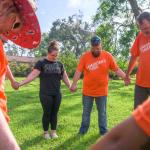
Fewer Americans are reading or otherwise engaging with the Bible, according to new research from the American Bible Society, but there is reason for hope.
The downward trend continues to unfold in the newly released chapter 3 of the State of the Bible report. But chapter 3 offers hope — especially among Gen Z adults who frequently engage with the Bible — the non-profit organization says.
The chapter also “highlights the impact of forgiveness and frequent Bible engagement on improving the overall quality of human life.”
The State of the Bible
The American Bible Society launched its landmark annual study of the State of the Bible in 2011. Researchers looking at Americans’ relationships with God, faith and the Bible have consistently found that reading and otherwise engaging with the Bible shape people’s choices and transform their relationships for the better.
Research indicates that people flourish when they engage deeply with the Bible. However …
- Daily, weekly and occasional Bible use is down slightly from last year.
- The proportion of people attending church in person has increased each of the last three years.
- Almost half of U.S. adults have experienced grief or loss in the past year, which often results in anxiety and trauma.
- The groups at highest risk are Gen Z adults and millennials.
Human Flourishing
Harvard University developed the Human Flourishing Index in 2017, and the American Bible Society has been using this research tool since January 2020. Researchers introduced a mid-year survey that year and have tracked “flourishing” every January since then.
They look at the following:
- Happiness
- Mental & physical health
- Meaning & purpose
- Close social relationships
- Character & purpose
The Latest Key Findings
Chapter 3 in the State of the Bible report highlights these findings:
- Americans experienced a slight drop in their overall Human Flourishing score, but most areas of human flourishing have returned to pre-pandemic levels or slightly higher. Mental and physical health levels continued a two-year decline, which is concerning. But interestingly, Americans’ confidence in their financial and material stability has increased after declining in 2023.
- Findings on Gen Z adults (18-to-27-year-olds) reveal that this group has…
-
- Highest stress levels of any age group
- Lowest scores in life’s “meaning and purpose”
- Lowest levels of hope of any age group
These results aren’t surprising given the stressful decisions that young Americans must make. Decisions such as:
What do I want to do with my life? Should I attend college, receive other kinds of training or find a job now? What kind of work do I want to do? Do I want to live with my parents for a while or go out on my own? Do I want to marry? When should I start a family? Do I even want children?
No wonder Gen Z adults are stressed out.
Gen Z adults lack a strong connection to church, the Bible and God, despite research that shows “frequent interaction with Scripture is a key component in overall well-being,” the American Bible Society said.
But here is where the organization has found hope in Gen Z adults who engage with Scripture (see chapter 3, State of the Bible).
“Not only do they score higher on the Human Flourishing scale than other young adults who don’t read the Bible – but they have the highest score of any generation,” according to John Farquhar Plake, PhD., the American Bible Society’s chief innovation officer and editor-in-chief of the State of the Bible series.
Plake added that more research is needed, but these findings suggest “that the unique challenges keeping young adults from flourishing are countered by a regular connection with God in Scripture.
Chapter 3 also highlights these findings:
- The ability to forgive is a key factor when it comes to human flourishing, according to the American Bible Society.
- “Individuals who strongly agree that they can forgive another person, with or without apology, score higher on the Human Flourishing scale than those who strongly disagree,” the organization noted.
- “Without exception, the more forgiving people are, the more they flourish,” the report noted.
Researchers asked people to respond to this statement: “I am able to sincerely forgive whatever someone else has done to me, regardless of whether they ever ask for forgiveness or not.”
- The group that strongly agreed with the statement scored 7.7 on the Human Flourishing Index.
- The group that somewhat agreed scored 7.1.
- The group that somewhat disagreed scored 6.6.
- The group that strongly disagreed scored 6.0 (See page 57 in the State of the Bible 2024 https://sotb.research.bible/ to learn more.)
It’s also important to note the following:
- The Scripturally engaged group scored highest on human flourishing with 7.9. This group also had the highest score in the Meaning and Purpose category with 8.3.
- Those who are open to the Bible but not scripturally engaged – the so-called ”Movable Middle” — scored 7.1 on human flourishing.
- The group that is not biblically engaged scored 6.7 in flourishing/well-being.
These findings are based on a nationally representative survey performed for the American Bible Society by NORC at the University of Chicago. Researchers conducted 2,506 online interviews with American adults from all 50 states and the District of Columbia earlier this year.
Where Do We Go From Here?
The American Bible Society plans to release six new chapters to the 2024 State of the Bible report between July and December. The research will look at neighboring, loneliness and philanthropy.
Why does this research matter? American Bible Society CEO Jennifer Holloran DSL explains that her organization believes “the Bible can transform people and communities through its incredible message of hope and healing.
“When people choose not to use a resource with such power to change their lives for the better, we want to understand why. Does it not seem relevant to them? Do they have trouble accessing it? Or do they just find it difficult to make it a priority in their increasingly busy lives?”
Holloran says that one of the greatest barriers to effective Scripture engagement is people’s lack of unity inside and outside the church — i.e., unity “in our love for the gospel and our belief that the message of Jesus transforms lives.
“The level of Scripture engagement in the United States remains lower than it could be with the right attention,” she says.
“It is no time for the church to become complacent. We should see this moment of declining Scripture engagement as the time to grow in our ability to work together as the body of Christ,” Holloran adds.
”It’s not just the health of the church that depends on it. It’s millions of individual lives that will otherwise miss out on the transforming power of Jesus.”
John Farquhar Plake says, “The challenge facing all of us in the church is to be the guides that those Bible test drivers (Movable Middle adults) are seeking.
“We must work to understand the needs of each person and carefully present them with the hope that is found in God’s Word.”


